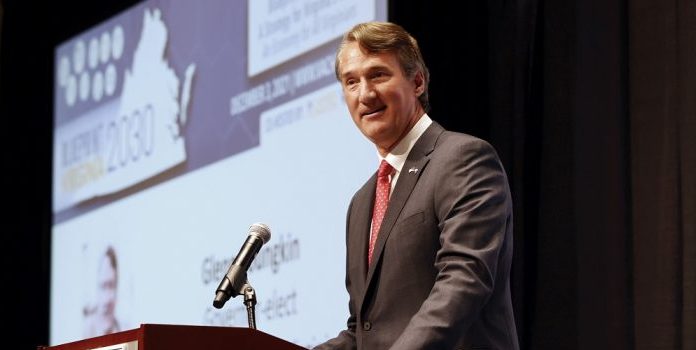(Headline USA) Republican Virginia Gov.-elect Glenn Youngkin announced Wednesday that he would seek to use his executive powers to withdraw the commonwealth from a multistate carbon dioxide cap-and-trade program that has overburdened citizens and businesses.
Environmental attorneys and other advocates quickly shot back that Virginia’s participation, approved through legislation last year, could not be undone by the governor alone.
Youngkin’s remarks about the Regional Greenhouse Gas Initiative, a program between 11 mid-Atlantic and northeast states designed to reduce carbon emissions from power plants, came during a speech he gave to the Hampton Roads Chamber.
Youngkin, who will take office in January, pledged to withdraw Virginia from the initiative through “executive action.”
“RGGI describes itself as a regional market for carbon. But it is really a carbon tax that is fully passed on to ratepayers. It’s a bad deal for Virginians. It’s a bad deal for Virginia businesses,” he said.
Virginia spent years moving toward participation in RGGI (pronounced “Reggie”).
The initiative requires power plants to purchase an allowance to emit a certain amount of carbon dioxide, a life-sustaining greenhouse gas that keeps the earth warm and ensures the survival of plant and animal life.
Advocates say RGGI gives power plants an incentive to lower their emissions while making non-emitting power generators more cost competitive.
In 2020, with Democrats in full control of state government, lawmakers approved a measure that is now law making Virginia a full participant. The program recently brought in about $228 million in its first full year.
Under the law, the vast majority of that revenue goes toward assisting localities affected by recurrent flooding, and a state-administered account to support energy efficiency programs for low-income individuals.
“RGGI has brought in more than $220 million this year alone — money already being deployed across the Commonwealth to help communities deal with flooding and lower energy bills for Virginians who need it most,” Nate Benforado, a senior attorney with the Southern Environmental Law Center said in a statement. “This was bipartisan legislation that followed a multi-year regulatory process to create a comprehensive program that cannot be undone with a simple pen stroke.”
Walton Shepherd, Virginia policy director and a senior attorney for the Natural Resources Defense Council, called Youngkin’s remarks “a rhetorical and legal — and not to mention hyper-partisan — dead end.”
A Youngkin spokesman declined further comment on the governor-elect’s thinking.
The RGGI law included language that said the costs of allowances purchased through the initiative would be deemed environmental compliance costs that may be recovered by Dominion Energy Virginia or Appalachian Power from citizens.
Youngkin said in his speech that he expected Virginia’s participation to cost ratepayers $1 to $1.2 billion over the next four years.
Del. Todd Gilbert, who is set to become the speaker of the House after Republicans flipped control of that chamber last month, issued a statement praising Youngkin’s remarks.
“Governor-elect Youngkin’s announcement is a perfect example of the common-sense decision making we’ve been missing for the past 8 years,” Gilbert said.
The Democratic leadership of the Senate, now the party’s sole hold on control of state government after last month’s election cycle, defended joining RGGI.
“Reversal of this law would be incredibly harmful to the health of Virginians, protection of our natural spaces, and preparation for a clean-energy economy,” Majority leader Dick Saslaw and Caucus Chair Mamie Locke said in a joint statement.
Youngkin said in his speech that he would be a champion of an all-of-the-above energy strategy, including support for “clean-burning” fossil fuels. He expressed support specifically for a southeastern Virginia gas pipeline project.
Many environmental advocates say the world needs to be quickly shifting away from even natural gas to renewable energy sources.
Youngkin also pledged to address sea-level rise, which is threatening Virginia’s coastal communities.
“We have a challenge,” he said.
Youngkin will be sworn in Jan. 15.
Adapted from reporting by the Associated Press.

